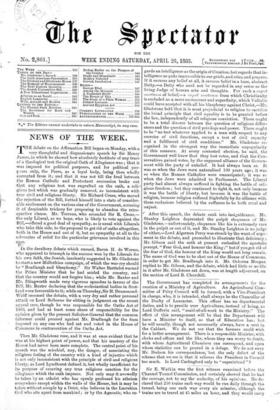Then Mr. Gladstone rose, and it was at once evident
that he was at his highest point of power, and that his mastery of the Rousts had never been more complete. The central point of his speech was the mischief, nay, the danger, of associating the religions feeling of the country with a kind of injustice which is not only inconsistent with the principle of civil and religions liberty, as Lord Lyndhurst defined it, but wholly insufficient for its purpose of securing any true religious sanction for the allegiance which the oath imposes. Not only may it avowedly be taken by an atheist who has openly professed his atheism everywhere except within the walls of the House, but it may be taken without scruple by a Deist, who believes in the Lucretian God who sits apart from mankind; or by the Agnostic, who re- gards an intelligence as the origin of Creation, but regards that in- telligence as quite inaccessible to our griefs, an d cries, and prayers. If it secures any belief at all, it secures belief in a bare, abstract Deity,—a Deity who need not be regarded in any sense as the living Judge of human acts and thoughts. For such a ca put mortuunz of belief,—a cupid inortuum from which Christianity is excluded as a mere excrescence and superfluity, which Voltaire could have accepted with all his blasphemy against Christ,—Mr. Gladstone held that it is most prejudicial to religion to sacrifice the broad principle that civil equality is to be granted before the law, independently of all religious conviction. There ought to be a total divorce between the question of religious differ- ences and the question of civil privilege and power. There ought to be "no test whatever applied to a man with respect to any exercise of civil functions, except a test of civil capacity and a fulfilment of civil conditions." Mr. Gladstone re- cognised in the strongest way the immediate unpopularity of this measure. At every contested election, he said, the Government well knew that they lost votes, and that the Con- servatives gained votes, by the supposed alliance of the Govern- ment with the party of unbelief. It had always been so. It was so when the Jews were naturalised 130 years ago ; it was so when the Roman Cathplics were emancipated ; it was so when the Jews were admitted to Parliament. The Liberal party had almost always suffered in fighting the battle of reli- gious freedom ; but they continued to fight it, not only because it was the battle of liberty, but because it was the battle of religion, because religion suffered frightfully by its alliance with these exclusions believed by the sufferers to be both cruel and unjust.


































